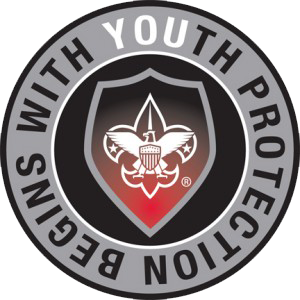
Youth Protection
The Boy Scouts of America places the greatest importance on creating the most secure environment possible for our youth members. To maintain such an environment, the BSA developed numerous procedural and leadership selection policies and provides parents and leaders with resources for the Cub Scout, Boy Scout, and Venturing programs.
Leadership Selection
The Boy Scouts of America takes great pride in the quality of our adult leadership. Being a leader in the BSA is a privilege, not a right. The quality of the program and the safety of our youth members call for high-quality adult leaders. We work closely with our chartered organizations to help recruit the best possible leaders for their units.
The chartered organization head or chartered organization representative must approve all leader applications and verify that personal references and any previous experience working with youth in other organizations have been checked before submitting the application to the local council.
Effective with rechartering for 2015, all adults must have a current Youth Protection certificate. The certificate must accompany applications for new adults or they will not be registered. There will no longer be a 30-day grace period. Continuing adults must have taken the course within the past two years.
Barriers to Abuse Within Scouting
The BSA has adopted the following policies to provide additional security for our members. These policies are primarily for the protection of our youth members; however, they also serve to protect our adult leaders from false accusations of abuse.
- Two-deep leadership. Two registered adult leaders or one registered leader and a parent of a participant, or other adult, one of whom must be 21 years of age or older, are required on all trips and outings. The chartered organization is responsible for ensuring that sufficient leadership is provided for all activities.
- No one-on-one contact. One-on-one contact between adults and youth members is not permitted. In situations that require personal conferences, such as a Scoutmaster’s conference, the meeting is to be conducted in view of other adults and youths.
- Respect of privacy. Adult leaders must respect the privacy of youth members in situations such as changing clothes and taking showers at camp, and intrude only to the extent that health and safety require. Adults must protect their own privacy in similar situations.
- Cameras, imaging, and digital devices. While most campers and leaders use cameras and other imaging devices responsibly, it has become very easy to invade the privacy of individuals. It is inappropriate to use any device capable of recording or transmitting visual images in shower houses, restrooms, or other areas where privacy is expected by participants.
- Separate accommodations. When camping, no youth is permitted to sleep in the tent of an adult other than his own parent or guardian. Councils are strongly encouraged to have separate shower and latrine facilities for females. When separate facilities are not available, separate times for male and female use should be scheduled and posted for showers.
- Proper preparation for high-adventure activities. Activities with elements of risk should never be undertaken without proper preparation, equipment, clothing, supervision, and safety measures.
- No secret organizations. The Boy Scouts of America does not recognize any secret organizations as part of its program. All aspects of the Scouting program are open to observation by parents and leaders.
- Appropriate attire. Proper clothing for activities is required. For example, skinny-dipping is not appropriate as part of Scouting.
- Constructive discipline. Discipline used in Scouting should be constructive and reflect Scouting’s values. Corporal punishment is never permitted.
- Hazing prohibited. Physical hazing and initiations are prohibited and may not be included as part of any Scouting activity.
- Junior leader training and supervision. Adult leaders must monitor and guide the leadership techniques used by junior leaders and ensure that BSA policies are followed.
- Member responsibilities. All members of the Boy Scouts of America are expected to conduct themselves in accordance with the principles set forth in the Scout Oath and Law. Physical violence, hazing, bullying, theft, verbal insults, drugs, and alcohol have no place in the Scouting program and may result in the revocation of a Scout’s membership in the unit.
- Unit responsibilities. The head of the chartered organization or chartered organization representative and the local council must approve the registration of the unit’s adult leader. Adult leaders of Scouting units are responsible for monitoring the behavior of youth members and interceding when necessary. Parents of youth members who misbehave should be informed and asked for assistance in dealing with it.
Digital Privacy
A key ingredient for a safe and healthy Scouting experience is the respect for privacy. Advances in technology are enabling new forms of social interaction that extend beyond the appropriate use of cameras or recording devices (see “Barriers to Abuse Within Scouting”). Sending sexually explicit photographs or videos electronically or “sexting” by cell phones is a form of texting being practiced primarily by young adults and children as young as middle-school age. Sexting is neither safe, nor private, nor an approved form of communication and can lead to severe legal consequences for the sender and the receiver. Although most campers and leaders use digital devices responsibly, educating them about the appropriate use of cell phones and cameras would be a good safety and privacy measure.
Source, Boy Scouts of America website
